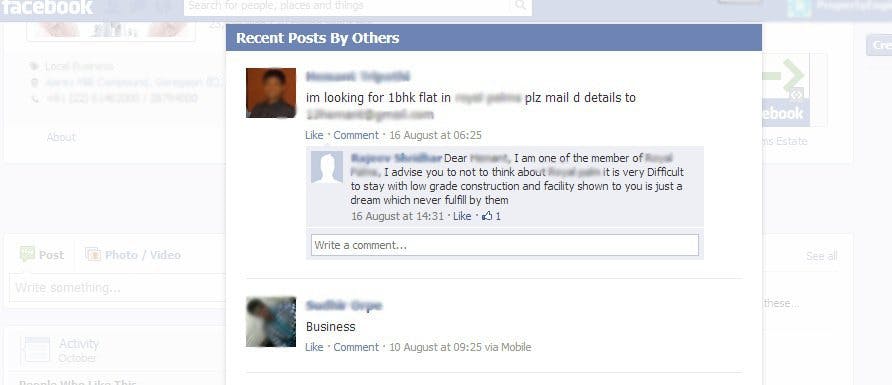Don't diss me on my Facebook page!
Wednesday October 31, 2012

“But what if they don’t like me?” she says as you take her hand and lead her into her first grade classroom. You assure her that it will be okay; that she’ll make plenty of new friends and that you’ll be there to collect her at the end of the day. You hope that you’re right. After all, she’s your sweet princess, what’s not to like? And yet you can’t get the thought of the potential class bully, the smarty-pants-know-it-all, out of your head. You hold thumbs that that child isn’t in her class.
The fear of rejection settles in early on. We know that often our thoughts are irrational but the risk lurks. As we make bigger gestures, establish our worldview, get passionate about what we do and move into the public spotlight, the risk increases. Logic states that not everyone will like you all of the time, but the majority of us try exceptionally hard to ensure that we get it right most of the time.
In the property development marketing world, your primary objective is to get people to like the homes you’re selling. You want them to buy into the dream of living in the development you’ve poured blood, sweat and tears into. You use various tools to highlight the property’s perks, and whilst we all know transparency is ‘good’, you quietly hope that no one spots any flaws in your plan.
Enter social media…
Facebook and Twitter and other social media sites provide a wonderful way for you as the ‘seller’ to engage with your potential ‘buyers’. These sites have revolutionised the way we market by prompting us to be up-to-date, target-specific and relevant in our approach. Businesses that have active Facebook page are more likely to succeed in today’s competitive market.
Enter the slightly risqué side of social media…
User’s opinions. If you’re lucky, the people following your various pages will have one because nothing is worse than mindless robots ‘liking’ your page . The right approach is to take their opinions seriously because in the social media world (and yes, the word ‘social’ was quite deliberate when the phrase was coined), peer-review is King. If you’re confident in what you’re selling and you work hard to establish relationships online, most of the comments you receive will be the positive, feel-good, pat yourself on the back types. Occasionally you’ll receive a less-than polite remark left on your wall. You may receive downright drivel. You’ll have to fight the urge to delete it, block the user, switch off your computer and curse the person under your breath because...
The one thing worse than a bad review is censorship of ‘said’ bad review…
Whilst Facebook offers you the option to block comments from the followers of your page, we urge you (read: strongly urge you) NOT to remove the comments option from your social media site. Instead, we advise that you encourage people to participate in discussions on your page. Here are our reasons why:
- Your social media presence is more than a space for you to tell the world how amazing you are. Remember the key word is ‘social; and that includes a reciprocal relationship of sorts. By blocking comments, you tell your (potential) clients that you’re here to talk but not to listen.
- Whether someone leaves a helpful criticism or a rude remark on your wall, the way you respond to it shows the calibre of your team. If you’ve made a mistake, own up to it and encourage further dialogue. Phone them and ask them whether they would post a comment up once their issue has been resolved. If you’ve been wrongly accused or fallen prey to a cyber bully, take a public stand or find a clever way to spin the issue into a positive experience.
- Social media sites provide a great place to network with other service providers who could strengthen your brand i.e. photographers, architects and estate agents. If you block comments, you potentially damage great networking opportunities.
For many of us, our business, or the launch of a new development, can be likened to our child entering the first grade of school. We want to protect it from any potential brand-damaging culprits, and yet we also realise the negative impact ‘sheltering’ it from the public may have. If you haven’t taken the plunge and set up social media accounts for your business, you need to seriously consider whether you can afford to detach your business from the millions of people who actively engage on these sites each day. Whilst one cannot fully ‘control’ what happens in the social media space, with a bit of finesse, your critics may turn into your greatest supporters.